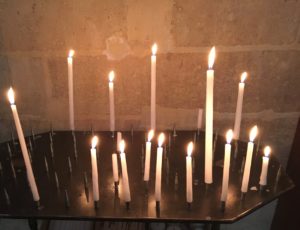Originally published in The Catholic Times Jan. 14, 2018

Photo: Mary van Balen
Samuel paid attention. His heart was “awake” even as he slept. One night, in the shrine at Shiloh where he lived under the care of its aged high priest, Eli, Samuel heard someone call his name. He didn’t turn over and go back to sleep. “Here I am,” he responded and hurried to Eli, assuming the summons had come from him.
But it hadn’t. Eli instructed the boy to go back to sleep. After this happened two more times, Eli realized that the Lord was speaking to Samuel and instructed him to reply, “Speak, Lord, for your servant is listening” if he were to hear the call again.
God did call again, and the boy responded as Eli had instructed. I wonder if Samuel had any expectations of what he might hear that night or if he was surprised to learn that the Lord planned to fulfill the Divine threats made against Eli and his family for their abuse of priestly duties, dishonoring the God they were to serve.
Samuel listened and then went back to sleep. In the morning, he had the courage to answer Eli’s question about what the Lord had said, and Eli had the humility to accept it. Samuel had spoken and been heard as the prophet God made him to be.
Scripture provides no definite age for Samuel at the time of this call. He is called “a boy.” He was the son of Hannah, a faithful woman embittered by long years of barrenness and the derision she suffered as a result. While on her family’s annual pilgrimage to the shrine at Shiloh, she laid her anguish before the Lord, weeping and imploring God to give her a male child. If so blessed, she vowed to give him to God’s service for as long as he lived. She had a son and true to her word, when he was of appropriate age, Hannah brought him to Shiloh and left him in Eli’s care.
No matter Samuel’s age, this story of a youth hearing and responding whole-heartedly to the call of God is captivating and is one of my favorites. How had Samuel become so “wide awake,” so attentive and receptive to God?

Photo: Mary van Balen
Surely, as with all of us, his early years were formative. Growing up in a family of faith, nursed and nurtured by a mother who loved and trusted God, and living in the shadow of the ark of God in the tabernacle in Shiloh must have influenced his relationship with the Holy One.
But, Samuel’s life sounds rosier than it was. (Don’t we often idealize the lives of others in comparison with our own?). Remember, his father had two wives who didn’t get along, and Eli and his sons were not faithful to the demands and requirements of their priestly ministry.
In the midst of it all, Samuel was able to attend to the call of God. He was a contemplative, aware of the Presence within and without, in the good and not so good, as he went about his duties. He must have taken time for solitude, resting in God and deepening his ability to hear and recognize the Holy Mystery that was the Source of his life and identity.
No matter the differences in time and circumstance between our lives and Samuel’s, we share the call to be people of prayer and to grow in our relationship with God. God has placed the gift of Divine Self in every one of us. Identifying that bit of Divinity and living into it, becoming the reflection of God we are made to be and remaining faithful to it is our life task. That’s why the story of young Samuel grabs our hearts: it is the story of us all.

Photo: Kathryn Holt
As 2018 unfolds, we can choose practices that will deepen our openness and help us “pay attention.” In the midst of life’s busyness, suffering, and challenges, we can take time to be still and rest in God, hearing God’s call however it comes. We can allow the Holy Mystery dwelling within to move and transform us and so, participate in transforming the world. We can say, like Samuel, “Speak, Lord, for your servant is listening.”
© 2018 Mary van Balen

Love this, Mary. A timely message to remember to listen, be present, and that all kinds of people can hear God’s voice!
Thank you Mary. Yes, we need all kinds of people to share with the world what God has shared with them. It takes us all to participate in God’s transforming work.
Happy to see you point out how important Samuels Mother is. Parents are not recognized enough for their part on the Mystical Body.